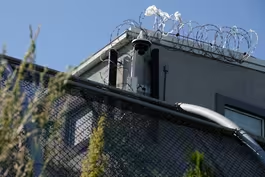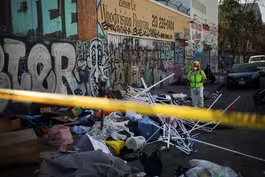
Brooks and Capehart on the Epstein files and Trump's base
Clip: 7/25/2025 | 13m 37sVideo has Closed Captions
Brooks and Capehart on the Epstein files fracturing Trump's base
New York Times columnist David Brooks and Washington Post associate editor Jonathan Capehart join Geoff Bennett to discuss the week in politics, including the debate over the Epstein files continues to cause a rift for Republicans, the Trump administration settles its fight with Columbia University and if Democrats can form a vision to fight back against Trump.
Problems playing video? | Closed Captioning Feedback
Problems playing video? | Closed Captioning Feedback
Major corporate funding for the PBS News Hour is provided by BDO, BNSF, Consumer Cellular, American Cruise Lines, and Raymond James. Funding for the PBS NewsHour Weekend is provided by...

Brooks and Capehart on the Epstein files and Trump's base
Clip: 7/25/2025 | 13m 37sVideo has Closed Captions
New York Times columnist David Brooks and Washington Post associate editor Jonathan Capehart join Geoff Bennett to discuss the week in politics, including the debate over the Epstein files continues to cause a rift for Republicans, the Trump administration settles its fight with Columbia University and if Democrats can form a vision to fight back against Trump.
Problems playing video? | Closed Captioning Feedback
How to Watch PBS News Hour
PBS News Hour is available to stream on pbs.org and the free PBS App, available on iPhone, Apple TV, Android TV, Android smartphones, Amazon Fire TV, Amazon Fire Tablet, Roku, Samsung Smart TV, and Vizio.
Providing Support for PBS.org
Learn Moreabout PBS online sponsorshipGEOFF BENNETT: As the debate over the Jeffrey Epstein files continues to cause a rift for Republicans, the Trump administration settles its fight with one elite university.
For analysis of the week's headlines, we turn now to Brooks and Capehart.
That's New York Times columnist David Brooks and Jonathan Capehart, associate editor for The Washington Post.
Great to see you both, as always.
JONATHAN CAPEHART: Hey, Geoff.
GEOFF BENNETT: So let's start with this deepening scandal surrounding the Epstein files and President Trump's ties to it.
There have been a number of revelations this past week.
There were the DOJ interviews with Ghislaine Maxwell occurring over two days.
What makes this moment different is that the controversy isn't just coming from outside critics.
It's creating, Jonathan, visible fractures within the president's own base.
Why does this Epstein episode seem to be breaking through, where other personal and political Donald Trump scandals have not?
JONATHAN CAPEHART: Because it's a -- part of it is a conspiracy theory that the president used to his benefit and to his advantage to curry favor, to win supporters.
And they were expecting him -- we elect you.
We put you back in the White House.
You are going to reveal the cabal of pedophiles who they all assumed were all Democrats, and you're going to show this.
And you put in Kash Patel as FBI director.
You put in Dan Bongino as the number two.
They are the one -- Pam Bondi as A.G.
They all also fed this conspiracy theory.
They get inside and suddenly find out there's nothing there, and then told people.
People lost their minds, understandably.
When you have been fed a diet of garbage for years, and then the people come in and they say, well, actually there's nothing to see here, yes, folks are upset, very upset.
GEOFF BENNETT: How do you see it, David?
DAVID BROOKS: Yes, I can't believe anybody - - people are voting on this.
Like, there are some QAnon people who are upset.
And there are people in the Trump administration who did exactly what Jonathan said.
But I just can't believe any vote -- people vote and they make decisions about politics based on their real lives, not some crazy conspiracy theory.
And every August, we -- Washington goes crazy with some stupid story.
And then in September, we think, what was that all about?
And so this year, we're a little early.
We're doing it in July.
But the idea that there's something there incriminating Donald Trump, his friendship with Epstein ended in 2004.
The Democrats, Joe Biden administration, they had these files for four years.
You think, if there had been something, you think they would have done something.
The Justice Department, the courts, they have all said there's nothing actionable here.
And so the problem is that - - what Jonathan described, and then that Donald Trump went ballistic about it and ordered his own administration to somehow solve the problem.
And then the underlying problem is that America seems to go through child abuse panics with some regularity.
When I was a baby reporter, there was something called the McMartin preschool case in Manhattan Beach, California, where an entire preschool was accused of this gigantic sex ring with children and the trial that went on for years before everybody was acquitted because there was nothing there.
But there's something about child abuse which is so horrific, it seems to captures people's minds and especially conspiracy mongers.
(CROSSTALK) GEOFF BENNETT: Go ahead.
JONATHAN CAPEHART: Although I would say, in the case of Epstein -- the case you're talking about, nothing was there.
But in the case of Epstein, we're talking, I think it's like 1,000 victims here.
And so that's also what we shouldn't lose sight of in this whole conversation.
While, politically-, in Washington, we're all talking about how this has damaged the president, how Democrats are trying to take -- use it to their advantage.
At the root of this were girls as young as 12 who were trafficked and abused by Jeffrey Epstein and by Ghislaine Maxwell.
And that should -- we should never lose sight of that.
DAVID BROOKS: Yes, that's a good point.
And that's one of the reasons they don't want to release the grand jury, because it's incriminating sometimes to the witnesses, to their families, pictures of them with their faces blacked out, with their clothing on.
So that's a very good point.
GEOFF BENNETT: And I hear you say this does not represent a shift in the loyalty calculus among Donald Trump's core supporters.
DAVID BROOKS: I would be shocked.
I would be shocked.
But there's obviously an active group around MAGA itself that they care.
But I -- people vote based on their lives, not on anything else.
GEOFF BENNETT: Well, I want to shift our focus to the news this past week that Columbia University will pay more than $200 million to the federal government after several investigations and months of negotiations with the Trump administration.
And the settlement restores Columbia's access to some $1.3 billion in federal funding.
The university agreed to take steps to curb antisemitism on its campus.
Jonathan, what's your take on Columbia's decision to settle?
And what message does it send to other universities?
I didn't know until I was talking with our team there's some 60 universities right now in active conversations with the Trump administration about protests and discrimination complaints.
You see the list there.
What do you make of it?
JONATHAN CAPEHART: It's terrible.
I think we were talking about this months ago, when Columbia University did something, and I think David put his finger on it.
It was like, on the one hand, you feel for the universities because the money that's taken away is money that goes to research, that goes to fund really important things that are not just important to the university, but important for all of us, in terms of advancing knowledge and advancing science.
But, on the other hand, the fact that the president of the United States is strong-arming, pressuring universities to basically give up some piece of their academic freedom is what's so alarming.
And, again, so Columbia's paying $200 million -- or actually $221 million if you throw in the court fees -- in order to get back one-point-something billion in funding.
Not sure, if I were at Columbia, I would feel really good about that.
And this decision only sort of highlights what Harvard University has done from moment one, which is, we're not playing this game.
There's a bigger thing here.
And, yes, we're going to be hurt by it, but standing up for ourselves, standing up for academic freedom and also standing up for all those other colleges and universities that look to Harvard as the leader.
If Harvard crumbles, what does that mean for the rest of them?
And I think Columbia has ceded a lot of sort of academic moral authority by what they were forced to do.
GEOFF BENNETT: We spoke with Michael Roth, the president of Wesleyan, on this program last night.
And he said that the Trump administration isn't just using this -- the issue of antisemitism to support and defend Jewish students.
They're using this as a way to chill speech that they find politically offensive.
How do you see it?
DAVID BROOKS: That's how I see it.
Michael Roth is right.
If I'm the leader of a university or of a nonprofit or of a foundation or of a private business, I'm thinking, this is an administration that uses extortionary power to try to destroy organizations or severely weaken organizations.
And so what's my response to that?
Well, there are two possible responses.
One, the one that's being chosen by most organizational leaders right now, is lay low.
It's so, well, maybe they won't pick on me, or maybe we will make a concession and they won't pick on me.
And if you go to a business conference and you hear what CEOs say about the Trump administration in private, I guarantee you it's nothing like what they don't say in public, because they're laying low.
That's one option, just hope they don't come for me.
The other option, which I thought we were going to have, is a broad coalition, not only of all universities, but all law firms, businesses, nonprofits foundations, anybody in any sector that could be part of the extortion attempt.
And they would say, we will band together.
There's strength of numbers.
If they come for one of us, they come for all of, sort of a domestic NATO Article V. And that's what I think needs to happen, because you leave Claire Shipman, the acting president of Columbia, out there all alone, well, of course she has no choice.
So there has to be a coalition.
And the coalitions that I have been hearing about are all defensive nature and quiet and private.
Somebody's got to take the fight back to the administration.
And it has to be organizational leaders acting together who collectively have a lot more power than they do alone.
GEOFF BENNETT: Building on that point, I mean, is this part of a broader pattern of using institutional levers, Jonathan, to weaken democracy?
Do you see this as a form of institutional capture?
JONATHAN CAPEHART: Yes.
I mean, that's -- there's no need to explain anymore.
I mean, what have we been watching for six months?
He's been doing it to the media.
He's been doing it to academia.
He's been doing it to the military.
He's been doing it to the federal -- to the judiciary up and down the ranks.
Yes.
The simple answer to your question is yes.
And I think it's the sort of flood-the-zone nature of all of this, that we sort of lose sight of the fact that all of these things are chipping away at our democracy, all of them.
GEOFF BENNETT: Well, that leads to our final topic, which is how Democrats increasingly are talking about all of this.
Just this past week, Beto O'Rourke, Pete Buttigieg, Rahm Emanuel, they're all pressing the case that Democrats have to fight back.
The question I have is, what does fighting back really mean in practice, Jonathan?
And how do you do that without alienating swing voters, moderate voters?
JONATHAN CAPEHART: At this point, when you fight, you're going to piss somebody off.
Excuse me.
And so I think -- when Donald Trump won in 2017 -- 2016, I spent the next year talking to all sorts of people, trying to understand, how did this guy win the presidency, when he ran -- he was opposite everything Republicans told me that they wanted in a president?
And the number one through line, the through line was, he fights.
And what Democrats are now demanding of their leaders is that they know -- I think Democratic Party faithful, they know that their leaders are in the minority, that there's not much that they can do.
But what are you -- you're just going to sit there and just let this happen?
We need you to stand up and fight, give voice to the fear and the anger and the frustration that's out there in the country, not just among Democrats, but just Americans who see this chipping away at democracy that they don't like.
So you have to fight.
And don't worry about ticking someone off or hurting a certain constituency.
In the end, it's about saving the country, saving our democracy.
And then you can put the pieces back together later.
But I think Beto O'Rourke is absolutely right.
If Democrats aren't willing to fight now, then it's going to be too late come 2028.
Stop waiting for a savior.
You are your own savior.
GEOFF BENNETT: What about that?
I mean, do Democrats risk abandoning their core - - their traditional brand of competence, norms, incrementalism even, in favor of something more combative?
DAVID BROOKS: Was competence one of their norms?
I did not know that.
(LAUGHTER) GEOFF BENNETT: Technocrats.
I mean... DAVID BROOKS: OK, that's fair.
Fair.
Yes, when I look at what the Democratic Party has and what they don't have, what they have is a lot of talent actually.
When we look at the people who are being talked about for 2028, Wes Moore, Andy Beshear, Kentucky governor, Rahm Emanuel, Pete Buttigieg, like, there's just a lot of talent.
It's a pretty good bench.
Cory Booker.
You can go on and on and on.
There are a lot of people, probably too many.
What they don't have is a vision.
Donald Trump had a vision: The elites betrayed you.
Ronald Reagan had a vision, free market, anti-communism.
Ronald Reagan happened because in the 1940s and the 1950s and 1960s, Milton Friedman and Friedrich von Hayek and Bill Buckley built the conservative movement.
Donald Trump happened because in the '60s, '70s and '80s and '90s, people like James Burnham and Pat Buchanan and Christopher Lasch wrote a book called "Revolt of the Elites" 30 years ago.
Everything Donald Trump says is in that Christopher Lasch book.
You got to start with a vision.
And that starts with ideas.
Then you build a movement and then you build a whole group of people.
Democrats do not have a vision.
They had a vision, New Deal vision, which was, we're going to soften capitalism using government.
We're going to help marginalized people get access to the mainstream American life.
GEOFF BENNETT: And spend a lot of money to do it.
DAVID BROOKS: And that -- but those are important visions.
They're not right for this populist moment.
And so once you hit the populist revolution, Democrats have to have a vision for this moment.
And, to me, that takes a long time.
It's not going to be professional politicians who are thinking about fund-raising who are going to come up with your vision.
It's somebody out there who's already thinking about it, but it takes a while.
GEOFF BENNETT: I saw you taking notes.
We got 30 seconds.
JONATHAN CAPEHART: Yes, they have a vision.
Democrats do have a vision.
They do have a vision for where they want to lead the country.
Their problem is that they spend too much time fighting with each other.
That's also part of the problem.
Stop fighting with each other.
Start focusing on what you need to do to save the democracy.
Band together.
And then you can worry about soothing hurt feelings.
GEOFF BENNETT: Jonathan Capehart, David Brooks, thanks so much.
Have a good weekend.
JONATHAN CAPEHART: Thanks, Geoff.
You too.
How private companies could cash in on Trump's deportations
Video has Closed Captions
Clip: 7/25/2025 | 5m 48s | How private companies could cash in on Trump's mass deportations (5m 48s)
Kagan criticizes justices over lack of explanation
Video has Closed Captions
Clip: 7/25/2025 | 6m 46s | Kagan criticizes fellow justices over lack of explanation in recent Supreme Court rulings (6m 46s)
News Wrap: Israel considering alternatives to Gaza ceasefire
Video has Closed Captions
Clip: 7/25/2025 | 4m 53s | News Wrap: Israel considering 'alternative options' to ceasefire with Hamas (4m 53s)
The politics behind the $8B Paramount-Skydance merger
Video has Closed Captions
Clip: 7/25/2025 | 7m 34s | The politics behind the $8B Paramount-Skydance merger (7m 34s)
Ruth Asawa exhibit celebrates her influential art and life
Video has Closed Captions
Clip: 7/25/2025 | 7m 42s | Ruth Asawa exhibition celebrates her influential art and extraordinary life (7m 42s)
What Trump's order on forced treatment means for unhoused
Video has Closed Captions
Clip: 7/25/2025 | 5m 53s | What Trump's order on clearing encampments, forced hospitalization means for the unhoused (5m 53s)
Providing Support for PBS.org
Learn Moreabout PBS online sponsorshipSupport for PBS provided by:
Major corporate funding for the PBS News Hour is provided by BDO, BNSF, Consumer Cellular, American Cruise Lines, and Raymond James. Funding for the PBS NewsHour Weekend is provided by...

















